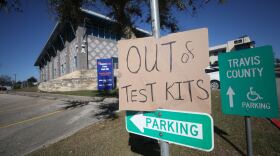Medical lab workers in Texas are dealing with a surge in COVID-19 tests as cases skyrocket nationwide.
COVID testing conducted in a lab, which include PCR tests, is an essential public health tool for slowing the spread of the virus. But experts say this recent onslaught of work for people who run the tests is coming on the heels of years of understaffing and burnout in the profession.
Rodney Rohde, the reagents professor and chair of the clinical laboratory science program at Texas State University, said many lab professionals are underpaid and overworked right now. He said it’s an ongoing issue that has only gotten worse during the pandemic.
“Our profession, in general, has issues primarily because of recruitment and retention efforts,” he said.
Rohde says many lab workers have been retiring in recent years or taking jobs in states that pay better than Texas.
As of Wednesday, he said, lab professionals in Texas have conducted more than 50 million COVID tests so far this year.
When labs are overrun, Rohde said, it's a serious concern for all areas of medicine because testing is the foundation for how doctors treat most of their patients.
“Most data shows that medical laboratory testing provides roughly 75% or more of the information needed by a physician to make about two-thirds of all medical decisions from cradle to grave,” he said. “So, if you have massive testing issues, it affects all levels of health care.”
Rohde said that could include results from screenings for cancer, sickle cell anemia or meningitis — literally all sorts of medical issues.
The lack of staffing in labs is also presenting serious concerns for the future of the profession, Rohde says. He said understaffing makes it harder to train new people to do this work, because there aren’t enough working professionals to teach.
“With shortages ongoing, they can’t take extra students,” he said. “And so it’s a vicious circle.”









